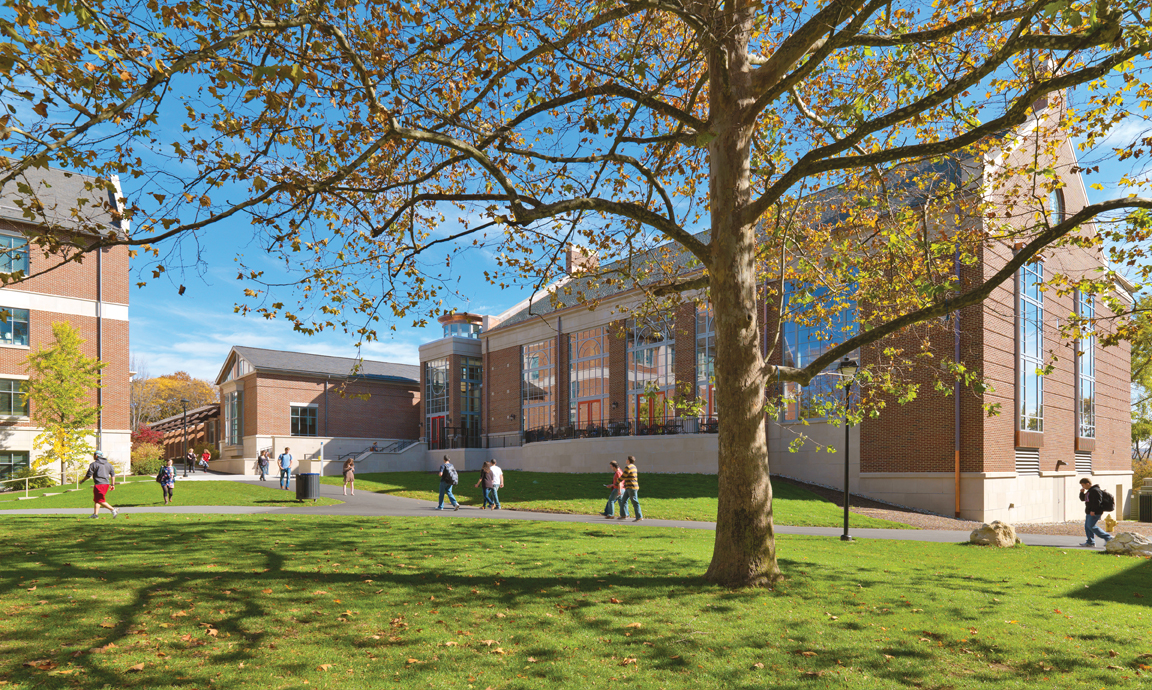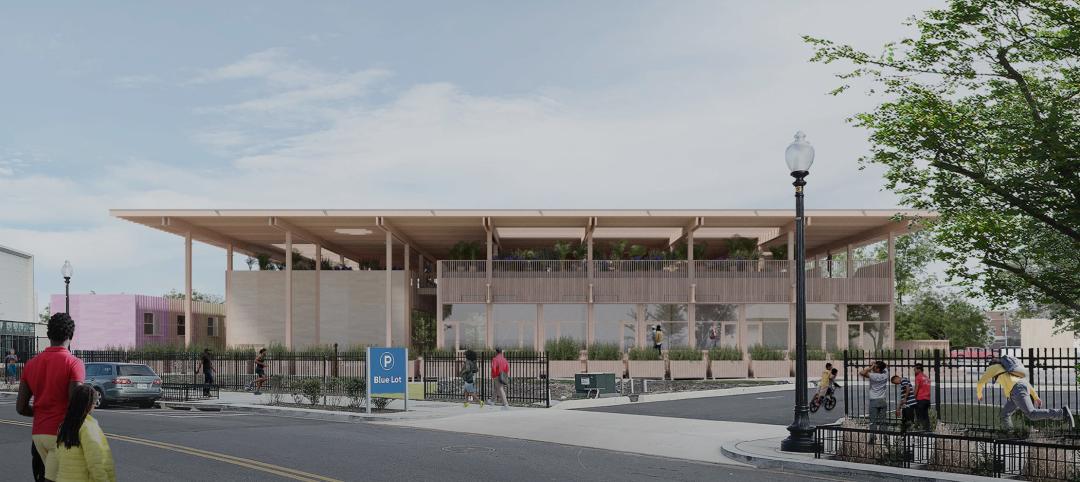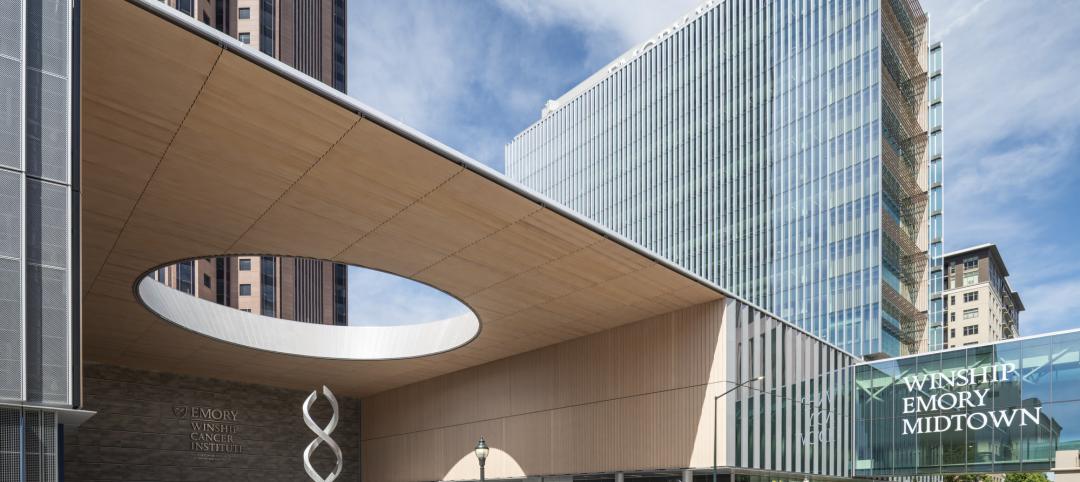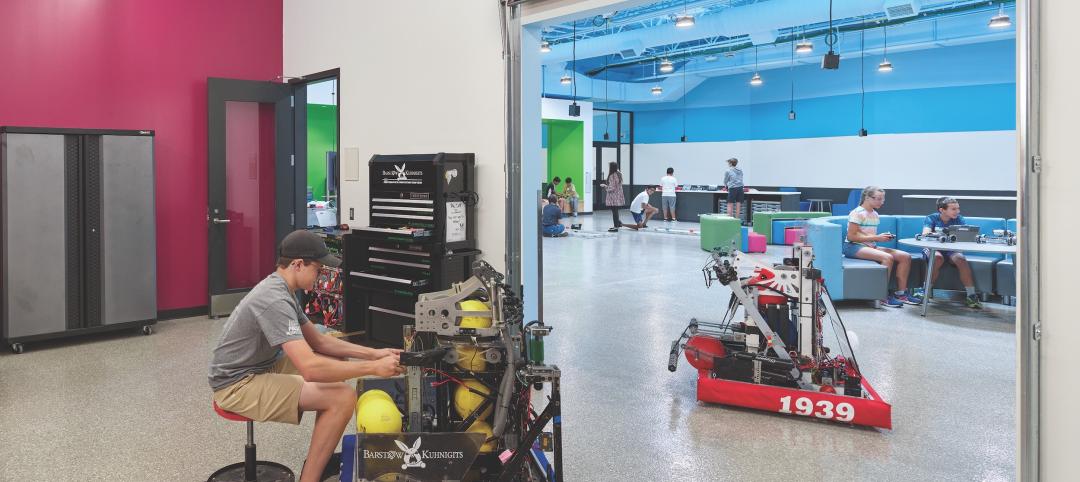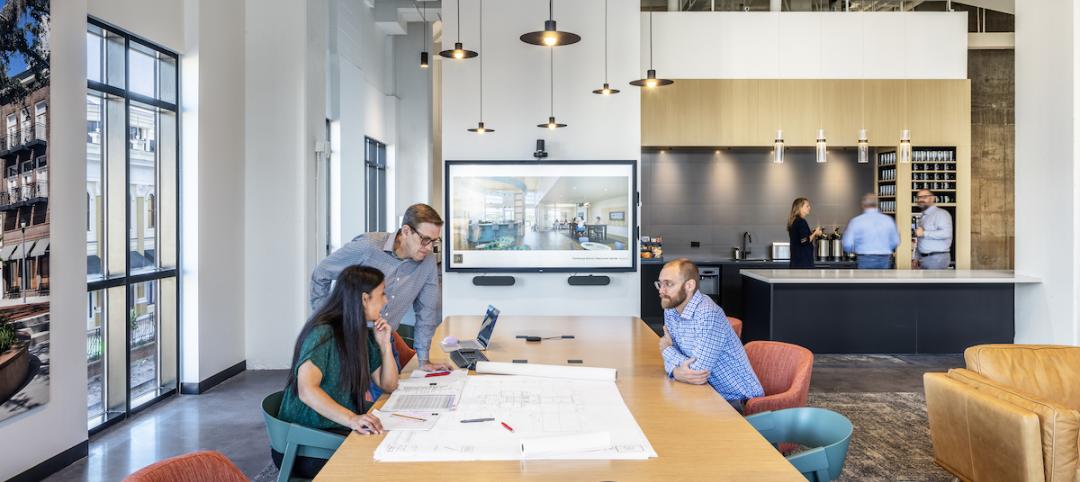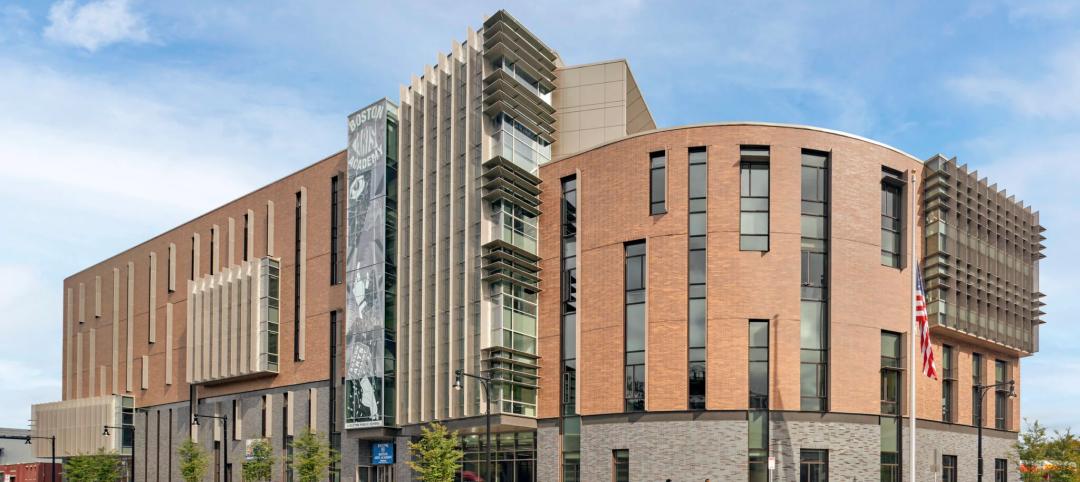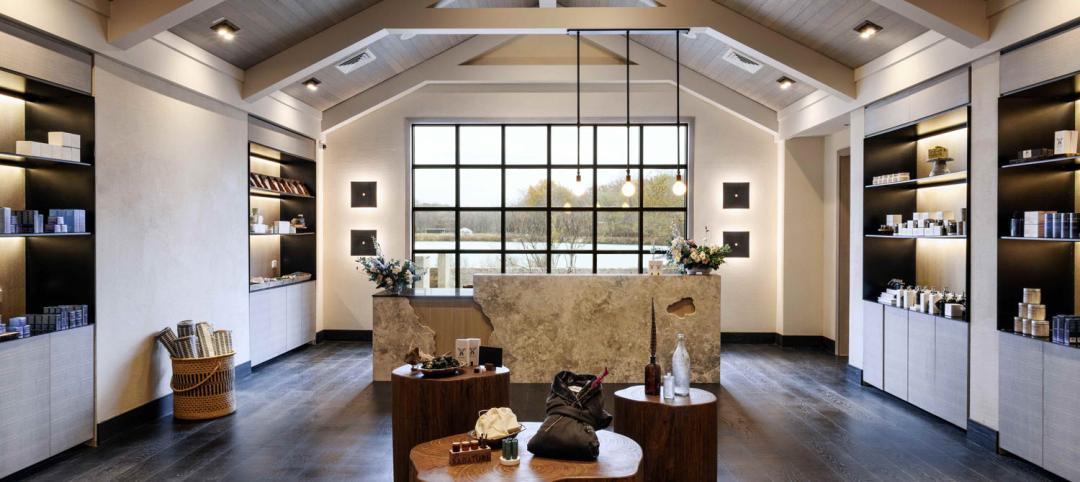At many colleges and universities, the student union serves as the focal point of campus activity. These days, campus planners are increasingly designing student unions as a multifunctional home to fuse student life and recreational activities under one roof.
Two years ago, Muhlenberg College, Allentown, Pa., embarked on a bold expansion and renovation project to dramatically upgrade the outdated Seegers Student Union.
The building was originally constructed in 1960 when enrollment just topped a thousand students. Despite previous expansions and renovations, the 66,000-sf student union was too tired, worn, and undersized to serve as a modern-day campus center for more recent needs of up to 3,300 guests per day.
Ultimately, college officials decided to transform the Seegers Student Union into a contemporary student dining and commons facility to meet the college’s growing, diverse needs.
PROJECT SUMMARY
Seegers Student Union, Muhlenberg College
Allentown, Pa.Building Team
Submitting firm: Bruner/Cott & Associates
Owner/developer: Muhlenberg College
Structural engineer: Barry Isett & Associates
Mechanical engineer: Snyder Hoffman Associated Inc.
General contractor: Alvin H. Butz Inc.General Information
Size: 70,000 sf
Construction cost: $20 million
Construction period: August 2008 to August 2010
Putting The Emphasis on Community Ideals
The Muhlenberg campus is located along a high ridge with a view of the Lehigh Valley. The architectural vocabulary reflects both English and German design traditions.
The 30,000-sf expansion and reconstruction focused on centralizing the Student Life and Student Organization offices, expanding the informal social space, and, most importantly, developing a 600-seat dining facility that could support the strong sense of community within the college.
In an effort to influence design criteria and create a sense of ownership with the Muhlenberg campus population, the Building Team relied on direct and indirect feedback with students, staff, and faculty. “We conducted a number of focus groups and hung a series of comment boards on which students wrote their suggestions, comments, and wishes for the Seegers Student Union,” says Dana Kelly, marketing director with design firm Bruner/Cott & Associates, Cambridge, Mass. “There was a lot of emphasis on the desire to ‘create a living room on campus’ that would serve as a neutral ground for all constituencies.” This factor influenced the social aspects of the design.
Senior staff members from the college served as the Steering Committee and helped clarify the project’s goals. “From an admissions perspective, it was important that the institution respond more deeply to the observances of Jewish students who make up one-third of the student body,” says Glenn Gerchman, director of Seegers Student Union. Maintaining a “strong sense of community” was also crucial. “That’s a characteristic recognized by nearly everyone who walks down Muhlenberg’s academic row,” he says.
Because the Seegers Student Union abuts the principal east-west pathway on the west end of the main quad, students, staff, and faculty were able to track construction progress. Not letting an educational opportunity pass, the Building Team created a Progress Plaza near the construction site where information about the project and its progress was continuously posted, according to Kelly.
Developing The Focal Point on Campus
The Building Team was charged with designing a facility that met a wide range of student dietary requirements and restrictions. One is the Noshery, a new kosher station that has two separate kitchens—one for meat preparation, one for dairy prep. “We believe this is the first fully integrated kosher station on a college campus,” says Kelly. “Integrated meaning that it is not segregated from the other stations like other kosher stations.”
The new food gallery also brings the kitchen out in the open. Food is prepared in a display-cooking format in front of the students, which brings food to students faster while reducing waste and labor cost.
“The response to this format has been tremendous,” says Gerchman. “The meal plan counts are up, and the students have responded favorably all around.”
The reconstructed 600-seat dining room has become a hearthstone visible from the surrounding campus. It can also host a wide variety of campus events. The Light Lounge serves as an active living room, while an outdoor terrace overlooking Brown Mall rounds out the amenities of the structure.
Designed for LEED Gold guidelines but not LEED-certified, the Seegers Student Union incorporates multiple sustainable measures: low-VOC paints and adhesives, recycled tile and carpet, renewable lumber and millwork, a spray-foam insulated building envelope, and integral air and vapor barriers.
“The new Seegers Student Union now completes a new quadrangle on the campus, providing students with an important connection to the outdoors,” says Kelly.
Seegers Student Union defines a new campus space for Muhlenberg College that reinforces the unified structure of the campus. The building balances the institutional ambitions of the college with a desire to be aesthetically and socially innovative. +
Delivery method: Design-bid-build
Related Stories
Retail Centers | Jun 2, 2023
David Adjaye-designed mass timber structure will be a business incubator for D.C.-area entrepreneurs
Construction was recently completed on The Retail Village at Sycamore & Oak, a 22,000-sf building that will serve as a business incubator for entrepreneurs, including emerging black businesses, in Washington, D.C. The facility, designed by Sir David Adjaye, the architect of the National Museum of African American History and Culture, is expected to attract retail and food concepts that originated in the community.
Mixed-Use | Jun 1, 2023
The Moore Building, a 16-story office and retail development, opens in Nashville’s Music Row district
Named after Elvis Presley’s onetime guitarist, The Moore Building, a 16-story office building with ground-floor retail space, has opened in Nashville’s Music Row district. Developed by Portman and Creed Investment Company and designed by Gresham Smith, The Moore Building offers 236,000 sf of office space and 8,500 sf of ground-floor retail.
Healthcare Facilities | Jun 1, 2023
High-rise cancer center delivers new model for oncology care
Atlanta’s 17-story Winship Cancer Institute at Emory Midtown features two-story communities that organize cancer care into one-stop destinations. Designed by Skidmore, Owings & Merrill (SOM) and May Architecture, the facility includes comprehensive oncology facilities—including inpatient beds, surgical capacity, infusion treatment, outpatient clinics, diagnostic imaging, linear accelerators, and areas for wellness, rehabilitation, and clinical research.
K-12 Schools | May 30, 2023
K-12 school sector trends for 2023
Budgeting and political pressures aside, the K-12 school building sector continues to evolve. Security remains a primary objective, as does offering students more varied career options.
Multifamily Housing | May 30, 2023
Boston’s new stretch code requires new multifamily structures to meet Passive House building requirements
Phius certifications are expected to become more common as states and cities boost green building standards. The City of Boston recently adopted Massachusetts’s so-called opt-in building code, a set of sustainability standards that goes beyond the standard state code.
Architects | May 30, 2023
LRK opens office in Orlando to grow its presence in Florida
LRK, a nationally recognized architectural, planning, and interior design firm, has opened its new office in downtown Orlando, Fla.
Urban Planning | May 25, 2023
4 considerations for increasing biodiversity in construction projects
As climate change is linked with biodiversity depletion, fostering biodiverse landscapes during construction can create benefits beyond the immediate surroundings of the project.
K-12 Schools | May 25, 2023
From net zero to net positive in K-12 schools
Perkins Eastman’s pursuit of healthy, net positive schools goes beyond environmental health; it targets all who work, teach, and learn inside them.
Contractors | May 24, 2023
The average U.S. contractor has 8.9 months worth of construction work in the pipeline, as of April 2023
Contractor backlogs climbed slightly in April, from a seven-month low the previous month, according to Associated Builders and Contractors.
Mass Timber | May 23, 2023
Luxury farm resort uses CLT framing and geothermal system to boost sustainability
Construction was recently completed on a 325-acre luxury farm resort in Franklin, Tenn., that is dedicated to agricultural innovation and sustainable, productive land use. With sustainability a key goal, The Inn and Spa at Southall was built with cross-laminated and heavy timber, and a geothermal variant refrigerant flow (VRF) heating and cooling system.


